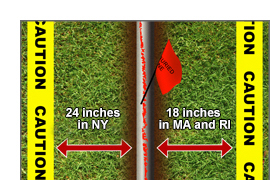|
Understanding the tolerance zone
Welcome to National Grid’s Tips of the Trade. National Grid is committed to your safety, and these tips are intended to help you work safely near our facilities. Please review these tips with your coworkers at your tailgate or toolbox meetings before work begins.
 Please help us improve our safety tips to meet your training needs. Take our two-minute survey. Please help us improve our safety tips to meet your training needs. Take our two-minute survey.
 What is the tolerance zone?
The tolerance zone is a safety area that spans the width of a marked underground utility plus a specified distance from each indicated outside edge of the utility. Dig with care in this zone to prevent damage to marked utility lines and to protect yourself and your coworkers from injury.
- In New York: Use only hand tools or vacuum technology in the tolerance zone, which is one-half of the known diameter plus 24 inches on either side of the designated centerline of buried utilities.
- In Massachusetts and Rhode Island: Power digging is not allowed. Hand digging or other nonintrusive methods are required in the tolerance zone, which is 18 inches on either side of the marked location of buried utilities.
Dig with care
When digging in the tolerance zone, use these nondestructive digging methods:
- Hand dig with a rounded or blunt shovel. Never use a pickaxe or pointed
spade, and never stomp on a shovel with both feet. That’s a sure way to damage
a utility line.
- Start your digging off to the side of the marked utility line. Use a gentle, prying motion to break away soil as you approach the utility laterally.
- Never pry against a utility line to remove soil.
- Vacuum excavation. This method uses suction and water to quickly and safely remove soil. Be mindful of water pressure; use lower pressure and tips with
multiple nozzles.
Proceed with caution
Take all necessary precautions to protect buried utilities from damage. Always expose buried utilities to verify their location before power digging near the tolerance zone. Once exposed, proceed with extreme caution. Power digging equipment can damage an underground utility in no time. Even hand digging can compromise buried utilities by removing supporting soil.
For more contractor safety information, visit ngridsafety.com.
|
Call 811 or enter an online request at least 72 hours before digging in Massachusetts and Rhode Island (excluding weekends and legal holidays) and at least two full working days in New York (excluding the date of your call, weekends and legal holidays).
It’s the law!
- Massachusetts and Rhode Island: digsafe.com
- Upstate New York: digsafelynewyork.com
- Metro New York, Long Island and the Rockaways: newyork-811.com
| |
To report emergencies, call 911 and National Grid immediately.
|
|
| |
In case of gas emergencies:
Long Island and the Rockaways:
911 and 1-800-490-0045
Metro New York:
911 and 1-718-643-4050
Upstate New York:
911 and 1-800-892-2345
Massachusetts:
911 and 1-800-233-5325
Rhode Island:
911 and 1-800-640-1595
|
|
In case of electric emergencies:
Upstate New York:
911 and 1-800-867-5222
Massachusetts:
911 and 1-800-465-1212
Rhode Island:
911 and 1-800-465-1212
Smell Gas. Act Fast.
|
|
|
|
|
|

